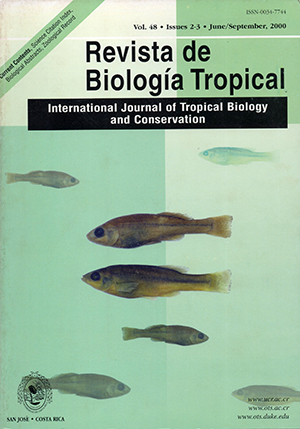Abstract
The effect of two natural light-growing conditions (understory versus light gaps) and the interaction with nutrient availability (through fertilization) were studied in the understory herb Begonia decandra, in the Luquillo Experimental Forest in Puerto Rico. Sixteen potted plants obtained from cuttings were randomly chosen and distributed in each of eighth fores! environments (four Iight gaps and four understories), for a total of 128 plants. Fertilizer was applied to half of the plants in each site. After seven months inthe two given microenvironments, increased light and fertilization resulted in greater growth and sorne changes in the biomass allocation pattems. AlI measured variables responded similarly to reported changes for tree seedlings and saplings from other tropical and subtropieal regions. Total growth parameters (height, biomass and leaf area) were very sensitive to inereases in the main resouree (light). The addition of nutrients was less important in producing ehanges in the alloeation variables (root to shoot ratio, leaf area ratio, and specifie leaf mass) under conditions of high light availability. Changes due to nutrient levels were relatively greater on plants grown under understory conditions. AIso, smalllight differenees among sites can cause significant changes in the variables related to total growth. Lastly, plant mortality in the nutrient treatments was found to be independent of mortality in two forest light environments. Sorne hypotheses about resource acquisition and plant growth are not supported by this data.##plugins.facebook.comentarios##

This work is licensed under a Creative Commons Attribution 4.0 International License.
Copyright (c) 2000 Revista de Biología Tropical
Downloads
Download data is not yet available.






